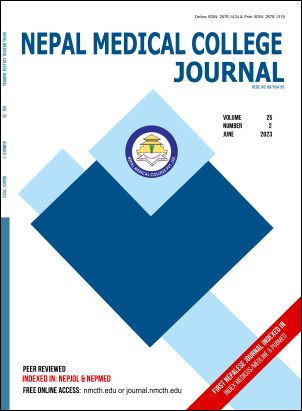Association Between COVID-19 Infection and New-Onset Diabetes in a Tertiary Care Hospital in Kathmandu
DOI:
https://doi.org/10.3126/nmcj.v25i2.56052Keywords:
COVID-19, diabetes mellitus, new onsetAbstract
In severe acute respiratory syndrome coronavirus 2 infections, reduced numbers of insulin secretory granules in beta cells and impaired glucose-stimulated insulin secretion have been observed, with insulin resistance and the onset of diabetes in them. This study was conducted to find the association between COVID-19 infection and new-onset diabetes. This was a cross-sectional study conducted in the Department of Internal Medicine at Nepal Medical College Teaching Hospital, for a duration of 6 months (July to December 2021). A total of 38 new-onset diabetes patients with a confirmed history of COVID-19 infection were enrolled in the study using a non-probability convenient sampling technique. Ethical clearance was taken from the Research and Institutional Review Committee, Nepal Medical College Teaching Hospital (Reference No.068- 077/078). Venous blood was collected and fasting blood glucose, post-prandial blood glucose, and HbA1c were measured. Data were analyzed in the Statistical Package for Social version 20.0. Analytical data were compared using Z- test for the parametric values and the Chi-Square test for the nonparametric values. Statistical significance was defined as a p-value of less than 0.05. As per clinical severity, 22 had mild, 13 had moderate and three had severe COVID-19 infection. The mean fasting blood sugar was 169.84 ± 40.72 mg/dl and the mean postprandial blood sugar was 249.92 ± 72.46 mg/dl. The mean HbA1c was 7.92 ± 1.11%. Out of 38 patients, 36 had a history of systemic steroid use and hyperglycemia was significantly associated with steroid use (Z=1.97, P=0.024).
Downloads
Downloads
Published
How to Cite
Issue
Section
License
Copyright (c) 2023 Nepal Medical College Journal

This work is licensed under a Creative Commons Attribution 4.0 International License.
This license enables reusers to distribute, remix, adapt, and build upon the material in any medium or format, so long as attribution is given to the creator. The license allows for commercial use.




